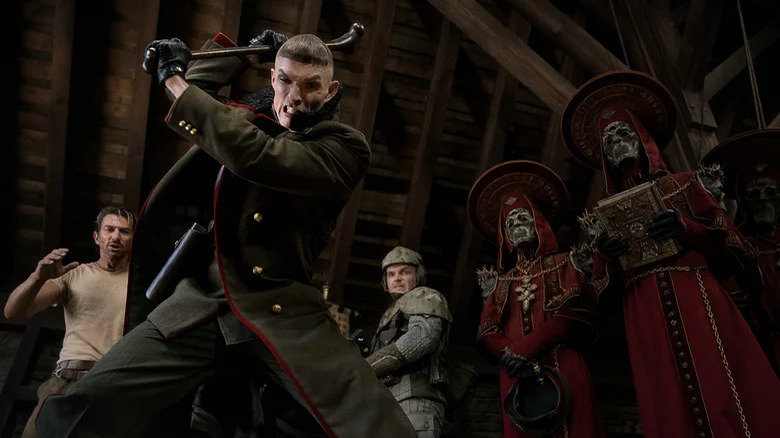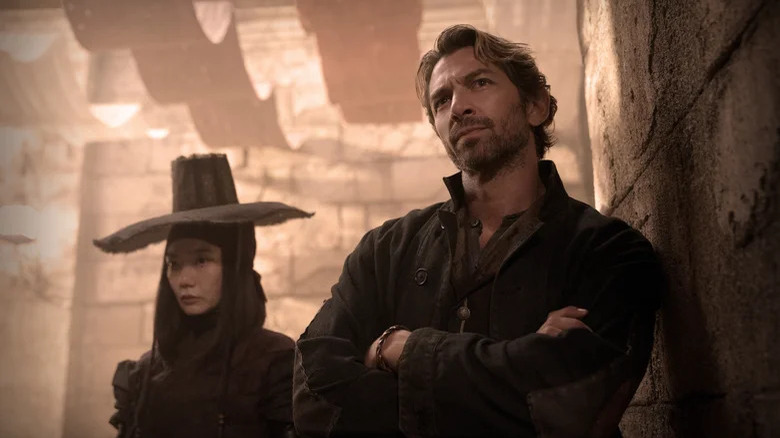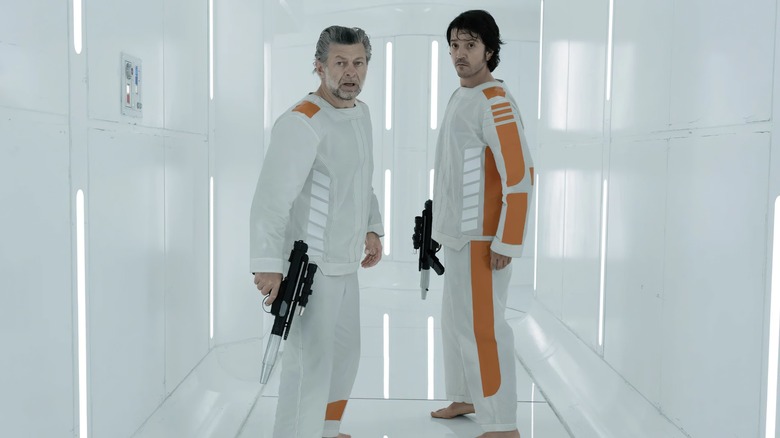Zack Snyder Sexualized A Star Wars Scene On Joe Rogan To Make A Point - Is He Right?
It's the age-old question: Would Star Wars be better if it had more sex? Okay, that's not the exact question, but it's the basic idea that Zack Snyder brought up on a recent episode of The Joe Rogan Experience. During the interview, the director discussed the upcoming April 19 release of "Rebel Moon — Part Two: The Scargiver," the R-rated cuts of both "Rebel Moon" installments that are scheduled to premiere later in 2024, and the influence "Heavy Metal Magazine" had on his overall approach to sci-fi. In the process, he also put a curious spin on a classic Star Wars scene.
"Like when Luke Skywalker walks into the cantina and is confronted by Walrus Man, is that sexual?" Snyder asked midway through his podcast appearance. He brought the cantina scene up as part of a larger discussion about his brand of sci-fi — a "Heavy Metal"-inspired approach that involves brutalist imagery and gritty, dirty worlds. "Is he like, he's f***ing with Luke," the director continued. "Luke's some farm boy in this rough bar. What's going to happen to Luke? That's a conversation you cannot have in the context of 'Star Wars.' There's no chance. That's not gonna happen. But like, in 'Heavy Metal,' that's real. That threat is real."
For as much as "Rebel Moon" begs, borrows, and outright steals from the Star Wars franchise, it's equally influenced by grimdark sci-fi like the "Warhammer 40,000" universe. It's a story in which — like in "Heavy Metal" — sex and violence come part and parcel with spaceships and laser guns. But is that really a deeper "deconstruction" of the genre, as Snyder suggests?
The Zack Snyder brand of maturity in sci-fi
We don't need to waste any time theorizing about what Zack Snyder's version of the cantina scene would be, because he's already shown us. "Rebel Moon — Part One: A Child of Fire" features a spaceport bar scene ripped straight from George Lucas' playbook, but with all the edgy layers that Snyder seems to adore. The stand-in for "Walrus Man" does indeed solicit farm boy Gunnar (Michiel Huisman) for sex, and when he doesn't get his way, a full-blown firefight breaks out.
It's certainly less kid-friendly than Star Wars, but that doesn't mean it's more complex or self-reflective. Snyder talks in the same interview about the way his "Heavy Metal" stylings allow him to "deconstruct" science fiction, but what does he mean by that? "It kind of broke me for comics for a while because it was always super sexy and super violent," Snyder told Rogan about reading "Heavy Metal" as a kid. "You'd get a normal comic and be like, 'Uh, when are they going to start f***ing?'"
Star Wars is designed with kids in mind. That's always been true. But making a story more gritty doesn't inherently make it more complex. Lucas pulled from old sci-fi adventure serials, and Snyder pulls from "Heavy Metal" — both pulpy genre exhibitions that are at times more interested in aesthetics than exploring deeper themes. Snyder has always been a visually oriented filmmaker, but he's not so much deconstructing the sci-fi genre as he is upholding a different one.
Rebel Moon only plays with the aesthetics of sex
Of course, the presence of sex is not a theme in and of itself. In "Rebel Moon" in particular, but also across Zack Snyder's work, the threat of sexual violence is often used as a signifier of proper evil. Before his cantina scene, we see an attempted assault by the imperial soldiers left behind in Gunnar's village. They attack a young woman from the community, which is the crime that prompts Kora (Sofia Boutella) to finally draw down and kill them.
Would Star Wars be more "deconstructive" if we saw stormtroopers pull some poor girl out of a Tatooine tavern before they're cut down by Obi-Wan Kenobi? Probably not. The Empire is built on violence — a core theme of both "Rebel Moon" and George Lucas' films — but Snyder is much more interested in portraying the aesthetics of imperial violence than in exploring the mechanics behind it.
This is perfectly fine, by the way. Sci-fi doesn't have to be deeply thematic or deconstructive. You're allowed to make a popcorn space movie, which is what Lucas did in 1977. But just because a young kid shouldn't watch something doesn't make it more mature. In "Rebel Moon," sex is used to alter the aesthetics — magnifying the evil of the villains or enhancing the "adultness" of the world. But these scenes are no deeper than Luke Skywalker's aunt and uncle being murdered by stormtroopers. Perhaps the "hard" R-rated cut of "Rebel Moon," as Snyder describes it, will change that, but making something more grotesque doesn't automatically make it more sophisticated.
Severity vs. deconstruction in sci-fi
If you're looking for science fiction stories that deconstruct the politics of sex or the genre in interesting ways, there are tons of options. You could watch Alex Garland's "Ex Machina," which is all about the intersections of technological advancements and male power fantasies. You could go to a theater right now and watch "Dune: Part Two," which picks apart the very Joseph Campbell hero's journey that Zack Snyder seems so interested in.
You could even visit the Star Wars universe and watch "Andor," a series that deftly unwraps the popcorn aesthetics of the franchise from the underlying ideas about fascism, rebellion, and imperial control. It's a show that explores how the bodies of the oppressed are used as tools by the ruling class, and how organized resistance means more than just assembling the Seven Samurai.
Zack Snyder's brand of grimdark sci-fi cries out to be taken seriously, but it often settles for displaying severe aesthetics rather than genuinely deep storytelling. Action scenes aren't more dramatic simply because they're in slow-motion, and unruly cantina customers aren't inherently more interesting because they're also sexually depraved. I like a lot of Snyder's movies, and I think there's a pulpy, campy value in his particular style — one that "Heavy Metal Magazine" embraced knowingly in its heyday. But there's nothing materially separating Snyder's bar patron from Ponda Baba. Yes, Walrus Man has a name.



